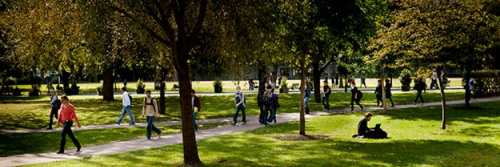Studying Economics
How do societies decide what to produce, how much of each commodity to produce, who consumes what and how consumption patterns vary over time? How do individuals make decisions on their education, their work, on where they live, on how much of each good to consume, on how much to save and on how the savings are invested? What determines prices, exchange rates, interest rates and the level of inflation? How does the globalization of the Canadian economy affect various sectors of the Canadian economy?
Economics students learn about these and many other issues central to the well-being of societies. Some economists focus on understanding why certain events occur; some try to devise and study economic policies that make a society better off, and yet others are involved in development of theoretical and statistical tools of analysis. A wealth of further information about the study of economics can be found on the American Economic Association's website.
An Economics education at McGill University may be pursued either in a non-mathematical and more flexible manner within the framework of our Majors concentration programs or in a more mathematical fashion within the framework of our Honours programs.
The Career Planning Service website offers information about some of the typical careers/jobs that are associated with your B.A. in Economics.
If you are considering taking an Economics course at another university, go to the Transfer Credit and Advanced Standing website. You will be directed to different sites depending on whether the other university is or is not in Quebec. Go to the appropriate one and follow the steps to determine course equivalence.
The Arts OASIS (Office of Advising and Student Information Services) website provides Arts students with general academic information and advice about issues such as faculty and degree requirements, registration issues, inter-faculty transfer, study away, academic standing, or graduation. In addition to advising students about such issues, either by appointment or on a daily drop-in basis, the Arts OASIS Faculty advisers offer a number of information sessions every term, such as degree planning workshops, study away workshops, and freshman information sessions.
For more information on Arts OASIS study abroad process, please visit their Study Abroad website. There you can plan and prepare your study at another university, read through their Transfer Credit Policy and access their Degree Planning Worksheet for Study Away
Prospective Undergraduate Students:
For information related to programs, faculties, finances and more, please consult McGill Undergraduate Admissions.
For information on applying to McGill including undergraduate admission requirements, application instructions and more, please contact McGill Enrolment Services.
For information on transfer credits, exemptions and more please see McGill's Transfer Credit and Advanced Standing website.
To e-mail or meet with one of our advisors, please see our Economics Advising webpage.

